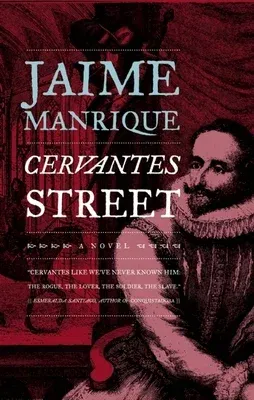A Latinidad List Best Book of 2012
Cervantes Street is exciting to read...Under Mr. Manrique's pen, the
world of renaissance Spain and the Mediterranean is made vivid, its
surface cracking with sudden violence and cruelty...This novel can be
read as a generous salute across the centuries from one writer to
another, as a sympathetic homage and recommendation...Cervantes Street
brings to life the real world behind the fantastic exploits of the
knight of La Mancha. The comic mishaps are funnier for being based in
fact. The romantic adventures are more affecting. Cervantes Street has
sent me back to Don Quixote.
--The Wall Street Journal
Manrique adopts a florid, epic style for his tale of 16th-century Spain,
one with the quality of a tale told by a troubadour rather than written
on the page. He ably captures the human qualities of the legendary
writer, as well as his swashbuckling.
--Publishers Weekly
Manrique has penned a well-written, well-researched, fast-paced
narrative ... An entertaining book ... and a superb retlling of
Cervantes's life.
--Library Journal
Cervantes Street is historical fiction at its best. Compact and
intense... The characters are wonderfully draw, the environments are
detailed and colorful and the feeling is genuine... a gripping,
adventuresome novel with profound insight into the ways in which we
choose our destiny.
--New York Journal of Books
"The novel is exciting, paced well, interesting and with a literary
mystery to boot."
--Seattle Post-Intelligencer
Hold onto your hats because Manrique has crafted a brilliant pastiche...
This fun, diverting, swift odyssey into Cervantes' travels... puts tall
tales where they belong, in capable fiction... Cervantes Street should
be in your hands.
--La Bloga
A sprawling vivacious big-hearted novel. Manrique is fantastically
talented and this is perhaps his masterpiece.
--Junot Díaz
The actual facts of Miguel de Cervantes's life seem to be snatched from
an epic tale: an impoverished and talented young poet nearly kills a man
in a duel and is forced into exile; later, he distinguishes himself in
battle and is severely wounded, losing the use of his left hand; on his
way back to Spain his ship is captured by pirates and he is sold into
slavery in Algiers; after prolonged imprisonment and failed escape
attempts, he makes his way back home, eventually settling in a remote
village in La Mancha to create his masterpiece, the first modern novel
in Western literature: Don Quixote.
Taking the bare bones of Cervantes' life, Jaime Manrique has
accomplished a singular feat: an engaging and highly accessible take on
a brilliant, enigmatic man and his epoch. This is an archetypal tale of
rivalry and revenge--featuring Cervantes's antagonistic relationship
with the man who would go on to write his own sequel to Don
Quixote--that is sure to garner comparisons to Peter Shaffer's
Amadeus, Alexandre Dumas' The Count of Monte Cristo, and, with its
extraordinary recreation of the life and times of Cervantes, to Hilary
Mantel's Wolf Hall.
Jaime Manrique is a novelist, essayist, and poet. His critically
acclaimed novels include Latin Moon in Manhattan and Our Lives Are
the Rivers. He is a Distinguished Lecturer in the Department of Foreign
Languages and Literature at the City College of New York.

